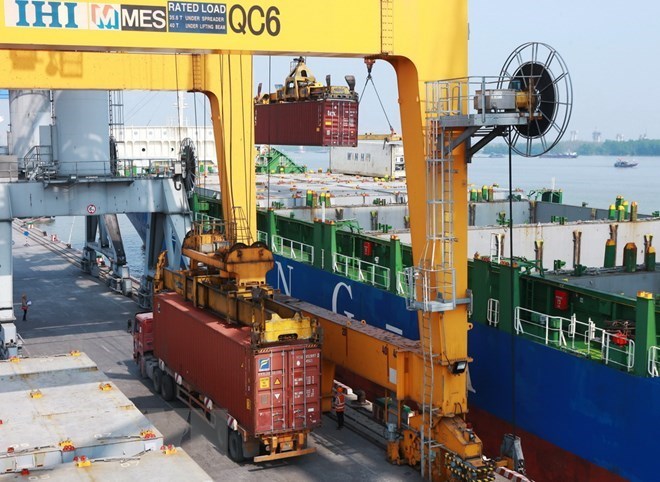
Vietnam’s economy grew at a fast pace in the first half of 2018 compared to the previous years, but there are indications that it is losing momentum – a problem not only in the last half of the year but also in 2019 and 2020.
Containers are loaded at Tan Vu Port of Hai Phong Port in Hai Phong city (Photo: VNA).
The remark was made by Dang Duc Anh, head of the analysis and
forecast section of the National Centre for Socio-economic Information and
Forecast (NCIF), at a discussion in Hanoi on August 8.
The growth rate reached 7.45 percent in the first quarter and
6.79 percent in the second quarter, but it is predicted to slow down to 6.72
percent during July-September and 6.56 percent in the last three months.
Meanwhile, average inflation is likely to be around 4 – 4.2 percent, according
to the NCIF.
Despite the 7.08-percent growth in the first six months,
there are many challenges during the rest of the year, including pressure from
the appreciation of the US dollar due to the possibility that the US Federal
Reserve could hike interest rates twice from now to the year’s end.
Resources for economic growth in the coming months are
unclear while the processing and manufacturing industry – a major driving force
– is depending on FDI firms and still at a low level in value chains. The
driving force from the FDI sector, which is becoming saturated in Vietnam, is
also reducing. Additionally, effects of business climate improvement policies
haven’t been clearly seen, he added.
Other challenges include impacts of the US-China trade war.
Echoing his view, other experts said the US-China trade
tension could lead to a domino effect on Vietnam’s economy.
Tran Toan Thang, head of the NCIF’s world economy section,
said the trade war, geopolitical risks and the US’s taxation policy reforms will
affect investment decision of multi-national American companies. The reduction
of corporate income tax in the US may also trigger a wave of tax cut or more
investment incentives in some countries to keep US businesses, which could
impact the competitiveness of Vietnam’s investment environment.
To maintain the growth momentum for the coming time, Vietnam
should create a more transparent investment climate, improve technological
capacity to attract more FDI companies, and actively respond to the US-China trade
war’s impacts and exchange rate changes.
Meanwhile, Luu Bich Ho, former Director of the Vietnam
Institute for Development Strategies at the Ministry of Planning and
Investment, said the country needs to press on with developing processing and
manufacturing and pay more attention to seeking export markets.
He noted amid US-China trade tensions, it is necessary to
prevent Chinese goods from taking advantage of the Vietnamese market to falsify
their origin to export to the US, or Vietnam could be taxed in a way China has
been.
Source: VNA
According to data from the Hoa Binh Provincial Party Committee, the industrial production index for the first six months of 2025 is estimated to have increased by 20% compared to the same period last year. This marks the highest year-on-year growth rate for this period since 2020.
In the first six months of 2025, Hoa Binh province’s export turnover was estimated at 1.145 billion USD, marking an 18.11% increase compared to the same period in 2024. Import turnover was estimated at $ 804 million, a 17.15% increase, which helped the province maintain a positive trade balance.
The lives of the ethnic minority farmers in Tan Lac district have gradually improved thanks to the new directions in agricultural production. This is a testament to the collective strength fostered through the professional associations and groups implemented by various levels of the district’s Farmers’ Union.
With the motto the "product quality comes first,” after nearly one year of establishment and operation, Muong village’s Clean Food Agricultural and Commercial Cooperative, located in Cau Hamlet, Hung Son Commune (Kim Boi district), has launched reputable, high-quality agricultural products to the market that are well-received by consumers. The products such as Muong village’s pork sausage, salt-cured chicken, and salt-cured pork hocks have gradually carved out a place in the market and they are on the path to obtaining the OCOP certification.
In the past, the phrase "bumper harvest, rock-bottom prices" was a familiar refrain for Vietnamese farmers engaged in fragmented, small-scale agriculture. But today, a new spirit is emerging across rural areas of Hoa Binh province - one of collaboration, organisation, and collective economic models that provide a stable foundation for production.
Maintaining growing area codes and packing facility codes in accordance with regulations is a mandatory requirement for agricultural products to be eligible for export. Recently, the Department of Agriculture and Environment of Hoa Binh province has intensified technical supervision of designated farming areas and packing facilities to safeguard the "green passport" that enables its products to access international markets.



